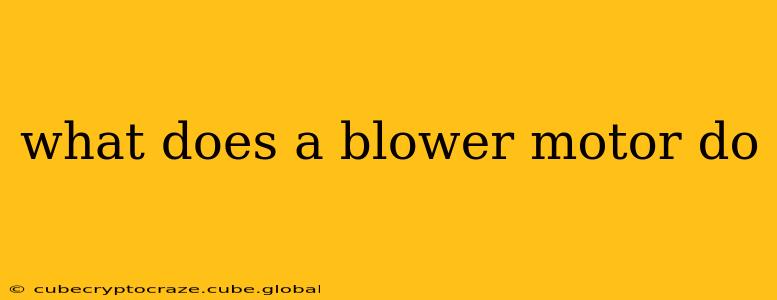What Does a Blower Motor Do? The Heart of Your HVAC System
The blower motor is a critical component of your heating, ventilation, and air conditioning (HVAC) system. It's the powerhouse that circulates air throughout your home, ensuring that your heating and cooling systems can effectively do their job. Without a functioning blower motor, your HVAC system is essentially useless, leaving you in uncomfortable temperatures.
This article will delve into the specifics of what a blower motor does, how it works, common problems, and answers to frequently asked questions.
How Does a Blower Motor Work?
The blower motor is an electric motor that's connected to a fan. When your thermostat calls for heating or cooling, the blower motor turns on, and the fan begins to move air. This air is drawn from the return vents and pushed through the HVAC system's components – the furnace or air handler for heating, and the evaporator coil for cooling. After passing through these components, the conditioned air is then distributed throughout your home via the supply vents.
What are the Different Types of Blower Motors?
There are several types of blower motors used in HVAC systems, each with its own characteristics and advantages:
-
Squirrel Cage Blower Motors: These are the most common type, known for their simple design and durability. They offer good performance at a reasonable cost.
-
Permanent Split Capacitor (PSC) Motors: These motors run at a single speed, making them straightforward and reliable.
-
Capacitor Start Induction Run (CSIR) Motors: These motors are also single-speed but offer higher starting torque, useful in overcoming higher resistance.
-
Variable-Speed Blower Motors: These offer greater control over airflow, allowing for more precise temperature regulation and potentially increased energy efficiency. They are more expensive upfront but can lead to long-term savings.
What Happens When the Blower Motor Fails?
A malfunctioning blower motor can lead to a number of problems, including:
-
No air circulation: The most obvious symptom is a complete lack of air blowing from the vents.
-
Uneven heating or cooling: Insufficient airflow can result in inconsistent temperatures throughout your home.
-
Overheating of the HVAC system: Restricted airflow can cause the system to overheat and potentially damage other components.
-
Unusual noises: A failing motor might produce strange sounds, like whirring, grinding, or humming.
How Long Does a Blower Motor Typically Last?
The lifespan of a blower motor varies, but a well-maintained motor can last for 10-15 years or even longer. However, factors like usage frequency, quality of the motor, and environmental conditions all play a role in its lifespan.
How Much Does it Cost to Replace a Blower Motor?
The cost of replacing a blower motor varies depending on factors like the type of motor, the accessibility of the unit, and labor costs in your area. It's best to contact an HVAC technician for an accurate estimate.
Can I Replace the Blower Motor Myself?
While some homeowners are comfortable performing this repair themselves, it's generally recommended to hire a qualified HVAC technician. Working with electrical components and HVAC systems can be dangerous if not handled properly. Incorrect installation can further damage your HVAC system or create safety hazards.
This comprehensive overview should provide a clear understanding of the blower motor's crucial role in your HVAC system. If you suspect a problem with your blower motor, it's always best to contact a qualified HVAC professional for diagnosis and repair.
